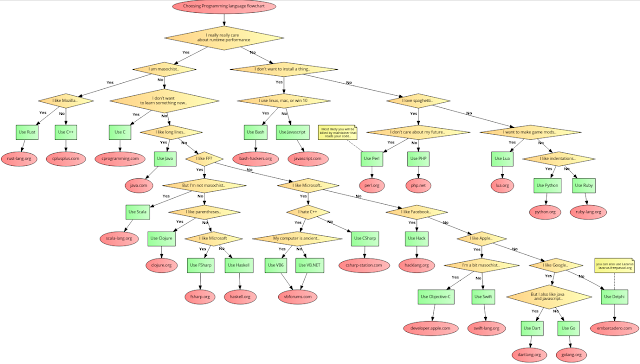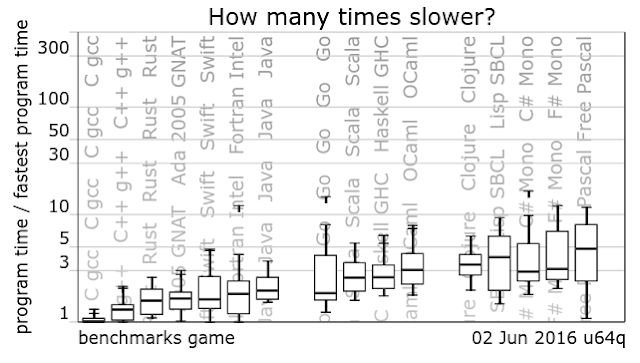(click for larger picture)
Anyway this just a joke, just like before (if programming language were religion/woman), may odds be in your favor..
Btw here's the code if you want to modify.. please use http://pastie.org if you want to do a long comment containing source code..
Choosing Programming language flowchart;
if(I really really care
about runtime performance) {
if(I am masochist..) {
if(I like Mozilla..) {
Use Rust;rust-lang.org
} else {
Use C++;cplusplus.com
}
} else if(I don't want
to learn something new..) {
Use C;cprogramming.com
} else if(I like long lines..) {
Use Java;java.com
} else if(I like FP?) {
if(But I'm not masochist..) {
Use Scala;scala-lang.org;
} else if(I like parentheses..) {
Use Clojure;clojure.org
} else if(I like Microsoft) {
Use FSharp;fsharp.org;
} else {
Use Haskell;haskell.org;
}
} else {
if(I like Microsoft..) {
if(I hate C++) {
if(My computer is ancient..) {
Use VB6;
} else {
Use VB.NET;
}
vbforums.com;
} else {
Use CSharp;csharp-station.com;
}
} else if(I like Facebook..) {
Use Hack;hacklang.org;
} else if(I like Apple..) {
if(I'm a bit masochist..) {
Use Objective-C;developer.apple.com;
} else {
Use Swift;swift-lang.org;
}
} else if(I like Google..) {
if(But I also like java
and javascript..) {
Use Dart;dartlang.org;
} else {
Use Go;golang.org;
}
} else {
// you can also use Lazarus
// lazarus.freepascal.org
Use Delphi;embarcadero.com;
}
}
} else {
if(I don't want to install a thing..) {
if(I use linux, mac, or win 10) {
Use Bash;bash-hackers.org;
} else {
Use Javascript;javascript.com;
}
} else if(I love spaghetti..) {
if(I don't care about my future..) {
// Most likely you will be killed by maintainer that reads your code..
Use Perl;perl.org;
} else {
Use PHP;php.net;
}
} else if(I want to make game mods..) {
Use Lua;lua.org;
} else if(I like indentations..) {
Use Python;python.org;
} else {
Use Ruby;ruby-lang.org;
}
}
Aww snaps, I forgot to add Elixir, Julia, and Crystal -_- oh well.. maybe sometime in the future.










